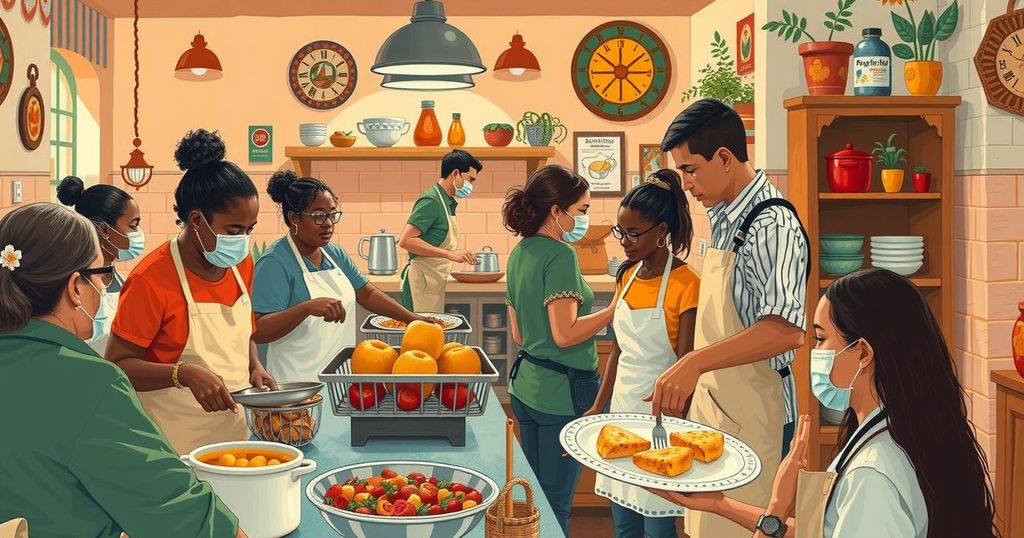Grassroots Activism in Sudan: A Beacon of Hope Amidst Crisis

Grassroots activists in war-torn Sudan are stepping in to provide essential services as state institutions fail. Amidst violence and resource scarcity, organizations like the Bahri Emergency Room offer mental health support, while others manage community food distribution and reunification services. The situation is dire, with over half of Sudan’s population in need of humanitarian assistance and local initiatives adapting to meet growing demands despite significant challenges.
In the face of a prolonged crisis, communities in war-torn Sudan are independently mobilizing to provide essential services previously offered by the state, which has collapsed. Grassroots activists are actively supporting families who have chosen to remain, delivering services ranging from mental health support in Emergency Response Rooms (ERRs) to volunteer networks that reconnect displaced families.
Two years into the conflict involving the Sudanese Armed Forces and the paramilitary Rapid Support Forces, aid distribution is inconsistent, internet availability is unreliable, and violence threatens civilians relentlessly. Despite these challenges, dedicated volunteer networks, many composed of war survivors, have emerged to aid their communities, demonstrating resilience in overwhelming circumstances.
Maab Labib, a mental health professional and coordinator at the Bahri Emergency Room, highlighted their efforts, stating, “We provide free mental health services to individuals and groups who are victims of war.” The team has expanded its reach, providing psychological support to over 1,500 people across various regions, emphasizing inclusivity across all demographics affected by the war.
The mental health support team has recognized the emotional toll the war has taken on caregivers as well. “The service providers themselves are displaced and traumatized,” Labib noted, and the provision of peer-to-peer support highlights the critical need for resources amidst ongoing violence.
These initiatives are part of a broader network of mutual aid groups established in response to Sudan’s political upheaval, reflecting community solidarity and resistance against state failure. According to Guido Lanfranchi of the Clingendael Institute, these local support networks embody a spirit of revolution, reinforcing community ties even amid escalating militarization.
However, these grassroots efforts also face danger; both the Sudanese Armed Forces and the Rapid Support Forces have attacked mutual aid groups. “Mutual aid groups are being attacked by both sides,” remarked Anette Hoffmann from the Clingendael Institute, highlighting the vulnerability of these organizations as the conflict persists.
Almost 25 million people, over half of Sudan’s population, require humanitarian assistance, according to the UN. The abrupt cessation of USAID-funded programs has exacerbated the crisis, diminishing resources that many vulnerable communities depend on for essential services such as food and medical supplies.
Organizations like the Safe Haven Organization have been pivotal in meeting community needs amidst the crisis. Mozamul Mohammed Ali, a project manager, shared, “In Sudan, we supported 4,500 families a day through our kitchens,” but the lack of funding forced some kitchens to close, escalating community pressures.
Adapting to the increasingly complex demands, grassroots groups have expanded their services from food provision to include health care, mental health services, and family reunification. Ali recounted a particularly poignant case of a 9-year-old boy separated from his family, illustrating the organization’s compassionate outreach.
The rise in mental health issues among the displaced population, especially among women and children, poses a significant challenge. Mohammed Abkar Goma from Safe Haven elaborated on the stigma surrounding mental health, emphasizing the group’s initiative in training locals in psychological first aid to help alleviate trauma in community shelters.
Despite the effective tenacity of these grassroots initiatives, leaders underscore the necessity for external support. Ali asserted, “The needs have become more complex,” emphasizing the urgent requirement for consistent health services and educational resources.
Lanfranchi eloquently described the grassroots activists as a testament to Sudan’s resilient civil society, embodying “quiet political defiance” amid systemic collapse. As conditions worsen, these community volunteers remain steadfast, asserting, “We are not heroes. We just couldn’t watch our people suffer without doing something.”
In summary, the grassroots movements in Sudan represent a resilient response to an ongoing humanitarian crisis following years of war and state collapse. Volunteers are delivering critical services such as mental health support and family reunification despite facing significant threats and resource limitations. The absence of international support exacerbates the challenges these communities confront, yet their commitment to assisting one another underscores the spirit of solidarity. As the situation continues to deteriorate, the need for recognition and support from the international community has never been more vital.
Original Source: www.arabnews.pk








